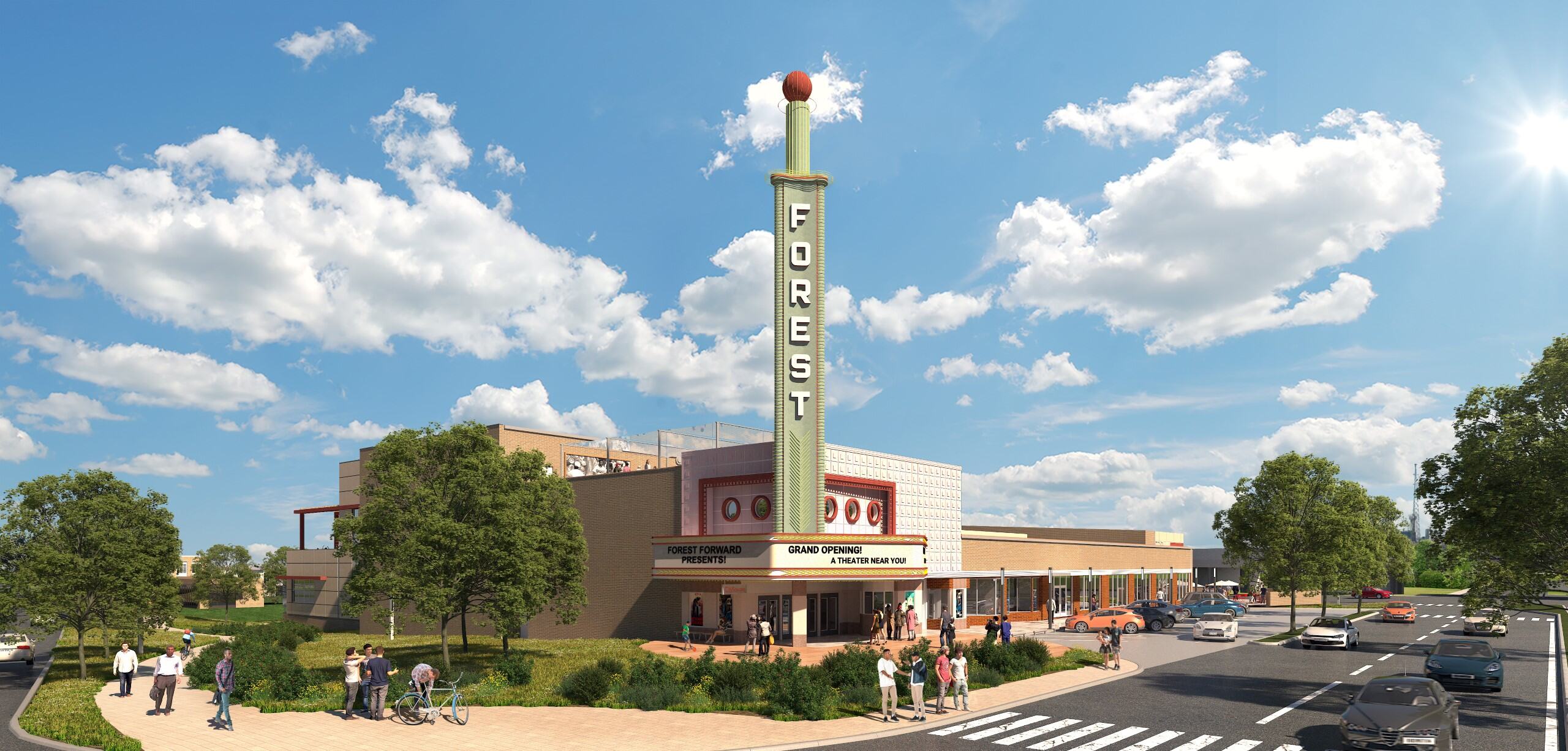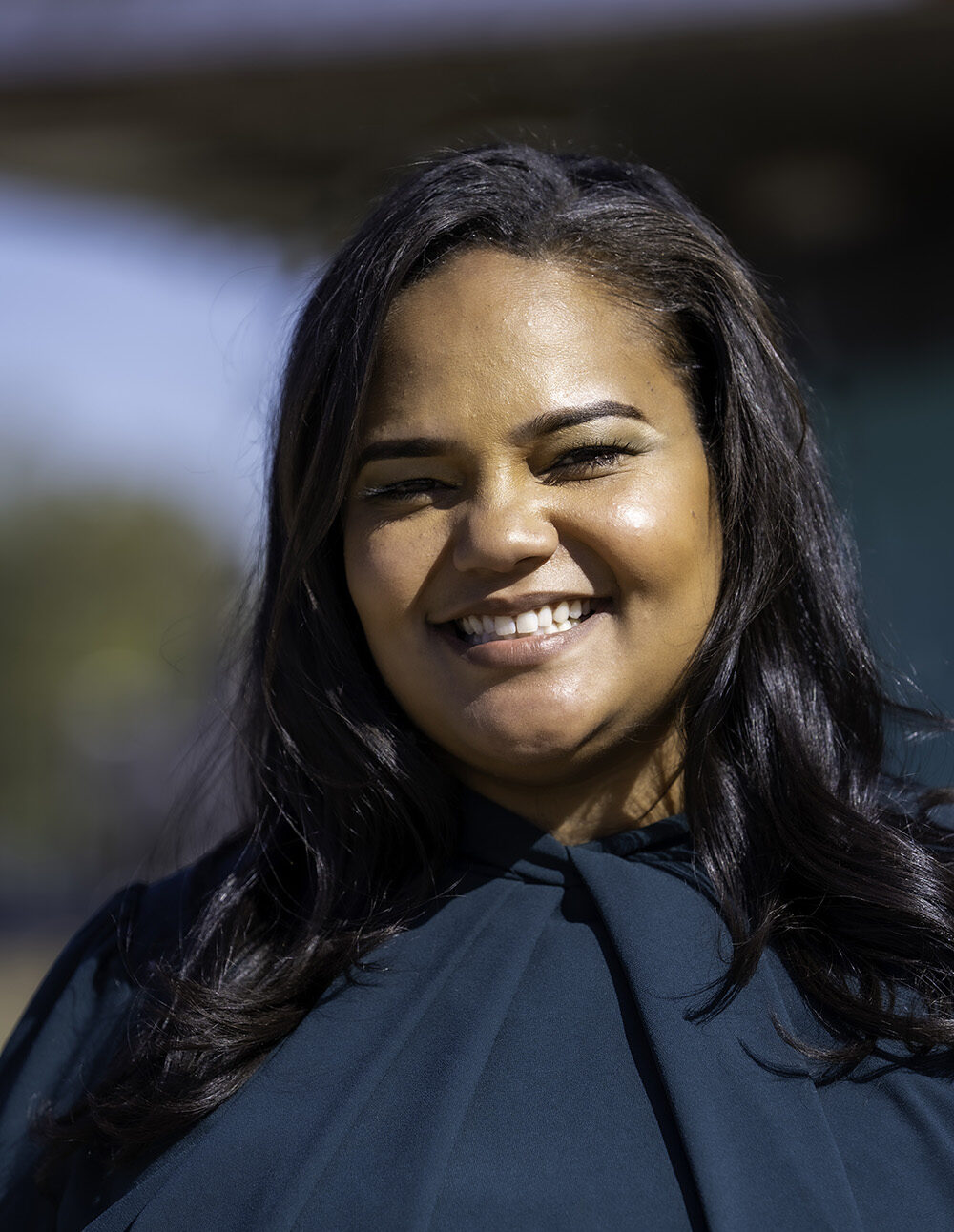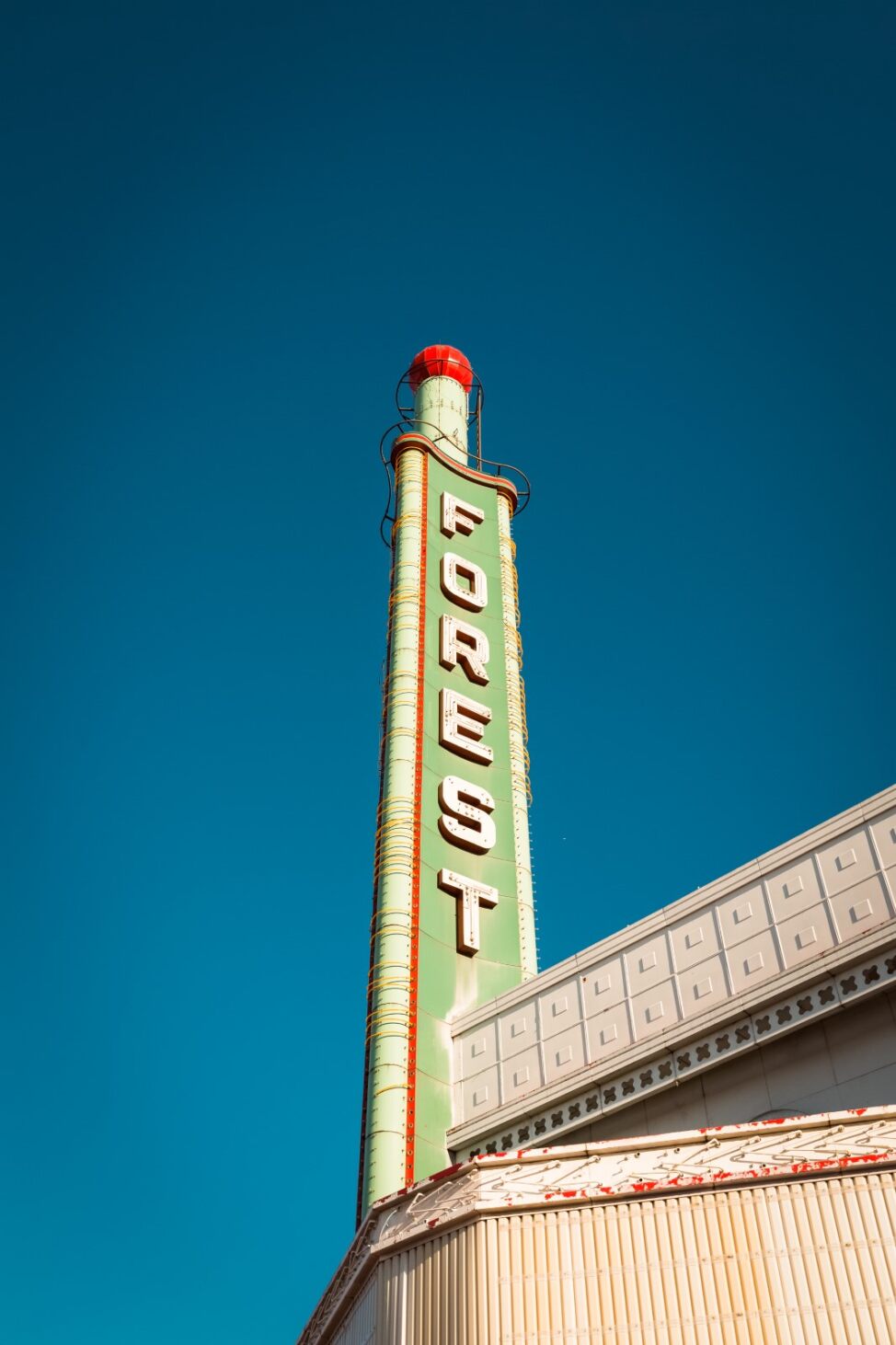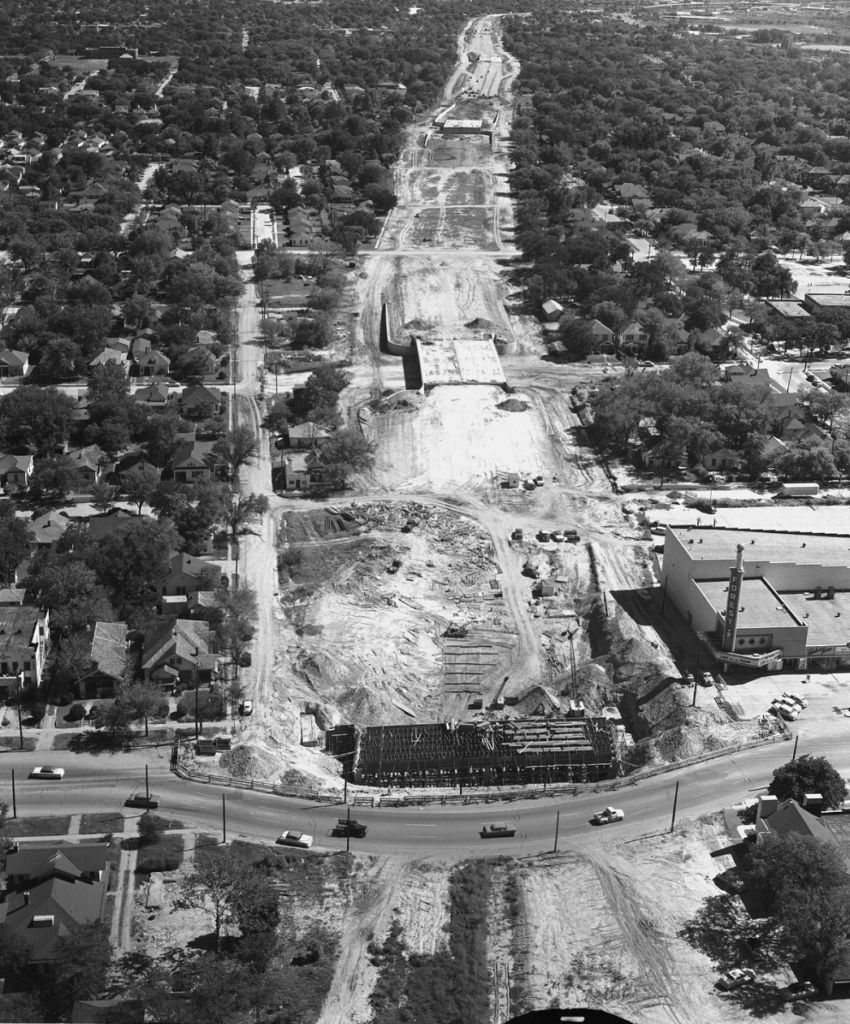Story by Jennie Trejo. Visuals by Renee Umsted. Photos provided by Forest Forward.

“Historically, it has been owned by a Jewish family,” says Elizabeth Wattley, president and CEO of Forest Forward, the nonprofit that stewards the theater. “But now, it’s entirely owned by our organization.”
The historic theater was constructed by the Hoblitzelles in 1949, when South Dallas was a primarily Jewish neighborhood, and MLK Boulevard was Forest Avenue. As Black families moved into South Dallas in the 1940s and ’50s and white families moved out, the theater, which opened as a whites-only venue in 1949, began catering to Black-only audiences by 1956.
Wattley began working on the Forest Theater revitalization when she was the director of strategic initiatives at CitySquare, which purchased the theater in 2017. In 2020 Wattley decided to branch off and filed a 501(c)3 for Forest Forward.
What originally started as an effort to revive the theater has expanded in scope, with Forest Forward acquiring several surrounding parcels of land between Julius Schepps Freeway and Central Expressway. Forest Forward now owns the theater, the former liquor store just north of the theater, the gas station next door to the liquor store, and the lots behind the theater where an infamous gambling house once stood.
All of the additional acquisitions prompt the question: How did Forest Forward go from reopening a historic theater to what it is calling a “neighborhood revitalization effort”?
“Quite frankly, a lot of people know land is king,” Wattley says. “And for this to be a true neighborhood revitalization effort, we needed to be able to build, and we had to own the land.”
The initial purchases were the most difficult, Wattley says, because it felt as if they were fundraising on a dream.

“I just kept saying, ‘I promise this is going to happen,’ ” she recalls. “But we also couldn’t be too vocal about our fundraising effort because that would just continue to make prices rise.”
Wattley announced Forest Forward’s $75.215 million capital campaign in 2021, a nod to the South Dallas neighborhood’s zip code and an amount that makes it one of the community’s most expensive real estate projects.
Over time, Forest Forward has acquired much of the triangle of land behind the theater, stretching south to Pennsylvania Avenue. One proposed use for this land is residential housing.
“It’s currently zoned for parking, so if we move forward with housing, we have the opportunity to work with the community for what type of housing,” Wattley explains.
She says that the housing project currently is in a conceptual phase, but they have floated the idea of townhomes or multifamily units. They are able to fit 150 units if they decide to move forward.
Zoning laws in the City of Dallas require entertainment spaces to have parking lots — about 350 parking spaces in the theater’s case. So where will the parking go if Forest Forward builds housing on the land currently zoned for it? Under the highway, adjacent to the theater.
To achieve this, Wattley has been working with Mike Morris, the director of transportation at the North Central Texas Council of Governments.
“There has been a lot of accomplishment in this work, but did I ever think that we would be able to pull off parking under the highway and have it funded?” Wattley asks. “That one is still a really big deal for me.”
Based on information from the Dallas Central Appraisal District, Forest Forward now owns 22 South Dallas properties. The land value of the properties is $1,596,840.
While Wattley is proud of big wins in acquiring the liquor store and the gambling house, she emphasizes there is still work to be done and negotiations to be made, especially in the triangle of land between the theater and Dr. Martin Luther King Jr. Arts Academy.
She points to a color-coded map showing the “ target geography” of their neighborhood revitalization efforts. Two-and-a-half parcels on her map are a different shade.
“This one’s actually a fascinating story,” Wattley says, referring to the half parcel at 1808 Peabody. “It’s owned by a prominent Black family in the City of Dallas.
“The reason it’s a little triangle is because it was taken in eminent domain years ago to build the highway. So they still own that little triangle. It’s an undeveloped bubble, but we’re working with them to see if we can acquire it to have all the lots.”
One parcel in the triangle at 1812 Peabody is in the Urban Land Bank, but Wattley affirmed that Forest Forward expects the City to work with them on acquiring it.
South Dallas Councilman Adam Bazaldua did not answer our questions about that parcel. He said in a statement that he is “currently in discussion with Forest Forward for a piece of Harwood street to be abandoned and used as a pedestrian amenity and serve as a connection between Forest Forward and the Martin Luther King Jr. Academy.”
After that, just one parcel remains, Wattley says. It was purchased for $80,000 from someone who “knew all about Forest Forward’s project,” Wattley says. When they tried to buy it from him, “this guy held us for $350,000,” more than four times what he paid for it, she says.
“He’s just no good,” Wattley says. “He’s very savvy in real estate, and he’s doing it all across Dallas.”
Because of situations like this, Wattley says she and her team learned to move quietly as they purchase land for the project.
“Land ownership and developers in South Dallas right now are… it’s just insane,” Wattley says. “It’s like Game of Thrones.”
Purchasing the liquor store across the street was tough, Wattley says. It was open 24 hours a day, seven days a week, and was incredibly profitable.
 “When we introduced ourselves, the owners actually wanted us to keep the liquor store and be the new tenants,” Wattley says. “They were like, ‘Why wouldn’t you want this business that already cash flows so much monthly?’ ”
“When we introduced ourselves, the owners actually wanted us to keep the liquor store and be the new tenants,” Wattley says. “They were like, ‘Why wouldn’t you want this business that already cash flows so much monthly?’ ”
Forest Forward began by purchasing the land next door to it, which previously was a gas station.
“That needs some environmental work because there’s a gas tank underground that’s leaking,” Wattley says. “So we’re working with the City to get that pulled out.”
In order to acquire the liquor store, the Forest Forward team implemented an aggressive fundraising campaign.
“There are people that really care about this work,” Wattley says, “and they helped us make the acquisition.”
Another big win for the Forest Forward team was acquiring the gambling house located behind the theater.
“Oh, everybody knows this gambling house,” Wattley says. “That gambling house had been in the community for over 30 years, and it was connected to the City of Dallas leadership. So, it was famous.”
Raising funds for the gambling house took more “savvy financing,” Wattley says, adding that they did it through “mixed sources,” including some financing structures through the LiftFund.
As soon as Forest Forward acquired the gambling house, they knocked it down.
Aside from the environmental work for the liquor store and the gas station, a significant amount of remediation work must be done on the theater.
“That building is just filled with asbestos, and we are doing a full abatement across the entire place,” Wattley says.
Forest Forward also is working with the City to update infrastructure in the neighborhood. Wattley points out the intersection where South Harwood Street and Peabody Avenue meet: “Our pipes are 100 years old, clay and 6 inches around. So we cannot redevelop this building without [the pipes] being replaced.”
Wattley says the theater structure needs $3.8 million of investment in infrastructure just to make it operational.
We asked Bazaldua about any City dollars invested or committed to the theater. He didn’t specify but says he is “committed and look[s] forward to continuing work with Forest Forward and DISD to make this project as successful as it possibly can.”
Forest Forward’s zoning request to renovate and redevelop the theater, build the underground parking, and temporarily use land north of the theater for construction parking, will be heard by the City Plan Commission on Thursday, mere hours before Forward Forward’s groundbreaking celebration. If approved, the plans would move forward to City Council for final approval.
Over the past several years, as Wattley has given tours of the theater to curious South Dallas neighbors, she pleaded with them: “Hold on to your land.”
This is one of the Dallas neighborhoods that the federal government labeled “definitely declining” in 1937 based on its Black population. The label stuck to property valuations until recent years when, suddenly, property developers and investors began seeing dollar signs in a devalued market adjacent to Downtown.
The sudden and rapid property value increases are making it hard for many longtime South Dallas residents to afford their property taxes and stay in their homes. Wattley says she wishes they just had a little more time.
“It’s not that new development isn’t wanted; it’s that new development needs to be built within the light of the community,” she says.
Elizabeth says she has learned the true impact of highway construction through this work. The SM Wright Highway wasn’t there when the theater was constructed in 1949. The highway was constructed in 1955, with eminent domain clearing a path for the highway to cut through the neighborhood.

Before the highway, “if you’re a person of color, you have to sit in the balcony,” Wattley says. “So they really weren’t catering to you; they really didn’t care if you came to it or not. But by 1956, the only way the theater could survive was to cater to the Black community that was there.
“What that tells me is how quickly a neighborhood could flip. That shows you how fast this mass exodus happens.”
Wattley believes it could flip again, just as quickly, which is why she has advised South Dallas neighbors not to sell their properties yet in the face of gentrification.
“If people are going to sell their property, or whatever the case may be, that is their personal business,” Wattley says. “But it is understanding what’s ahead. And if you can hold on, then it could prevent some of the mass slip.
“Then, the neighborhood could revitalize and serve the residents that are here. That was my goal.”
This article is a collaboration between Dallas Doing Good and Dallas Free Press. The purpose of our partnership is to combine efforts in areas where we overlap: South Dallas and West Dallas neighborhoods, “good stories” or community asset stories, stories involving neighborhood nonprofits, and certain civic stories.
Sign up with your email address to receive good stories, events, and volunteer opportunities in your inbox.